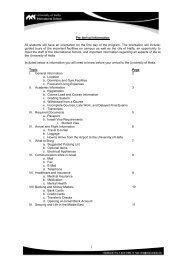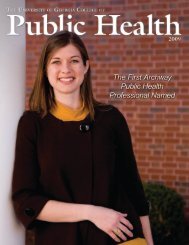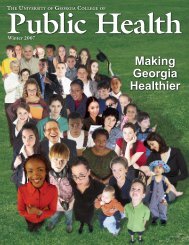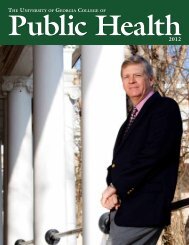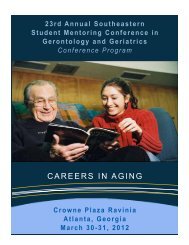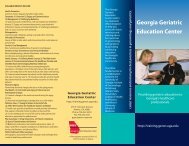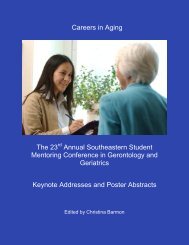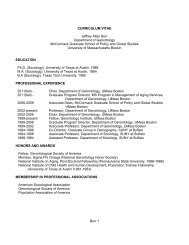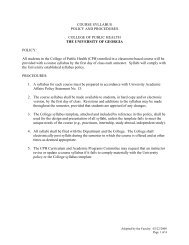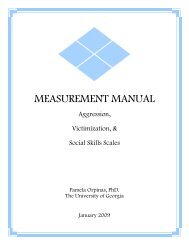Protecting Georgia's Waterways - College of Public Health
Protecting Georgia's Waterways - College of Public Health
Protecting Georgia's Waterways - College of Public Health
You also want an ePaper? Increase the reach of your titles
YUMPU automatically turns print PDFs into web optimized ePapers that Google loves.
photo by Nancy Evelyn<br />
Tyson Turner, a recent<br />
graduate <strong>of</strong> the <strong>College</strong><br />
<strong>of</strong> <strong>Public</strong> <strong>Health</strong>, pursued<br />
and earned a pair <strong>of</strong><br />
degrees from UGA and<br />
Duke University at the<br />
same time.<br />
spective, one that is population-based. I’m hoping that year <strong>of</strong> graduate study will<br />
give me that frame in the back <strong>of</strong> my mind.<br />
I’m really interested in doing outcome research, which looks at population<br />
outcomes for different treatments and interventions. Epidemiology fits with<br />
that very well. But I definitely want to practice clinical medicine.<br />
UGA: How did you find returning to UGA for graduate school after experiencing<br />
Duke<br />
Turner: The academic load is definitely difficult, particularly at times such<br />
as finals when multiple courses have assignments due, but the faculty at the<br />
<strong>College</strong> <strong>of</strong> <strong>Public</strong> <strong>Health</strong> was such a help by working with me whenever necessary<br />
to accommodate my (at times) cramped schedule. Also, being in medical<br />
school did wonders for my efficiency in regards to studying, writing papers,<br />
etc., and many <strong>of</strong> the time-management skills that are used there were a major<br />
help to me.<br />
UGA: Your graduate work at UGA concerned the incidence <strong>of</strong> tuberculosis<br />
in Georgia. Should Georgians be concerned about tuberculosis<br />
Turner: Every case <strong>of</strong> tuberculosis diagnosed by a physician has to be reported<br />
to the Division <strong>of</strong> <strong>Public</strong> <strong>Health</strong> at the State level, like anything with<br />
public health implications. The way TB is treated now is, the patient must have<br />
a long course <strong>of</strong> therapy; and they are taking the medication.<br />
In general, TB is still a disease that kills but not like the major killers (e.g.,<br />
cardiovascular disease, stroke, etc.) TB has resurgence once people get older and<br />
have a compromised immune system due to HIV, diabetes, mellitus, cancer, etc.<br />
UGA: What was your research concern<br />
Turner: Pr<strong>of</strong>essor Christopher Whalen and I partnered with the Georgia<br />
Division <strong>of</strong> <strong>Public</strong> <strong>Health</strong>’s tuberculosis branch to analyze the state’s tuberculosis<br />
database (each time a case <strong>of</strong> tuberculosis is diagnosed in Georgia it must<br />
be reported and recorded in this State-managed database). Using this data, we<br />
looked into some <strong>of</strong> the epidemiological factors associated with tuberculosis diagnosis,<br />
including a description <strong>of</strong> the cases based on age, sex, race/ethnicity, etc.<br />
Our main focus, though, was to try to find out why we are seeing an increase<br />
in tuberculosis cases in the foreign-born population in Georgia. We’re<br />
thinking it could be due to either increased immigration levels (i.e. more cases<br />
just because we’re having more immigrants into the state) or due to “ongoing<br />
transmission” in foreign-born communities once they immigrate into the state.<br />
We’ve also tried to look at the molecular “typing” <strong>of</strong> the TB strains (i.e., how<br />
we identify which strain <strong>of</strong> TB each individual contracts) to see how <strong>of</strong>ten TB<br />
strains are unique versus how <strong>of</strong>ten they are shared between many different<br />
cases across the state.)<br />
UGA: When did you realize you wanted to become a physician<br />
Turner: I grew up in Lincolnton, Ga., which is a small town on the Georgia/South<br />
Carolina border approximately 40 miles north <strong>of</strong> Augusta. I’m not<br />
sure when I first decided to apply to medical school; it was always something<br />
that was in the back <strong>of</strong> my mind, and I suppose eventually it just made its way<br />
to the forefront. (Not enthralling, I know.) Looking back on it, I suppose the<br />
pr<strong>of</strong>ession just made sense for me: I’ve always enjoyed science and have been<br />
intrigued by human health and illness, and medicine seems to be the best way<br />
for me to make a positive impact on others. No one in my family is a physician,<br />
but I did have a fair amount <strong>of</strong> exposure to the healthcare field through my father<br />
and sister, both <strong>of</strong> whom are pharmacists, and so I suppose I was attracted<br />
to the field in that way, too.<br />
(This article first appeard in the Summer 2009 issue <strong>of</strong> the Graduate<br />
School Magazine.)<br />
Global <strong>Health</strong> Symposium Connects<br />
UGA with the World<br />
By Johnathan McGinty<br />
Richard Schuster is a passionate<br />
believer in the core mission <strong>of</strong> the<br />
University <strong>of</strong> Georgia’s Center for<br />
Global <strong>Health</strong>, and it is that passion<br />
which drives research and academic<br />
pursuits.<br />
The Center for Global <strong>Health</strong>, a<br />
component <strong>of</strong> the <strong>College</strong> <strong>of</strong> <strong>Public</strong><br />
<strong>Health</strong>, has a clear purpose built upon<br />
identifying the best practices in health<br />
care, disseminating those practices<br />
across the globe and then encouraging<br />
their adoption.<br />
Schuster said the Global <strong>Health</strong><br />
Symposium, sponsored by the Center<br />
for Global <strong>Health</strong>, is a key component<br />
in disseminating that research and<br />
information to health care providers<br />
and also the public at large. This year’s<br />
symposium, held April 8-9 at the<br />
Coverdell Center for Biomedical and<br />
<strong>Health</strong> Sciences, focused on disease<br />
and health in East Africa.<br />
“Interest in global health has<br />
exploded both in the U.S. and around<br />
the world,” Schuster said. “The<br />
reason is that globalization is having<br />
a pr<strong>of</strong>ound impact everywhere in<br />
the world. And to reference Thomas<br />
Friedman’s famous book, the world<br />
really is flat, and it doesn’t matter<br />
where you are anymore, we’re all in<br />
contact with each other.”<br />
Schuster said the assumption that<br />
the best practices in health care are<br />
uni-directional, or that they simply<br />
originate in the U.S. and are spread<br />
out through the rest <strong>of</strong> the world, is<br />
a simplistic approach. For instance,<br />
there are vast cultural and societal<br />
challenges when it comes to adapting<br />
and adopting some <strong>of</strong> those models.<br />
Natalie Arford, a research<br />
coordinator at the Center for Global<br />
<strong>Health</strong>, noted that those cultural<br />
Richard Schuster<br />
differences require that some <strong>of</strong> the<br />
best practices must be modified to<br />
achieve success abroad.<br />
“For example, there are male<br />
doctors in Afghanistan, and they will<br />
bring in women soldiers to come and<br />
assist them on certain projects,” she<br />
said. “The men can’t go and examine<br />
the females, so they use the women<br />
soldiers as an intermediary.”<br />
Understanding those types <strong>of</strong><br />
differences is essential for successful<br />
implementation, and, for the past<br />
three years, the Global <strong>Health</strong><br />
Symposium has <strong>of</strong>fered the ability to<br />
share research and discuss practices.<br />
In line with this year’s emphasis<br />
on East Africa, the <strong>College</strong> <strong>of</strong><br />
<strong>Public</strong> <strong>Health</strong> has established<br />
multiple academic and educational<br />
relationships with institutions in<br />
various East African nations, including<br />
one with Makerere University in<br />
Uganda. Spearheaded by the work<br />
<strong>of</strong> UGA’s Christopher Whalen, he<br />
has established what Schuster deems<br />
a true partnership with the African<br />
institution.<br />
Thanks to a multi-year grant<br />
from the National Institute <strong>of</strong> <strong>Health</strong>,<br />
the partnership enables Makerere<br />
to conduct mutual research with Dr.<br />
Whalen and his team at the <strong>College</strong> <strong>of</strong><br />
<strong>Public</strong> <strong>Health</strong> and regularly exchange<br />
students with UGA.<br />
“In globalization, we <strong>of</strong>ten talk<br />
about the brain drain <strong>of</strong> people who<br />
come to America, highly educated,<br />
from around the world and stay here,”<br />
Schuster said. “This is an example <strong>of</strong><br />
people who are highly educated, who<br />
come here and get even more highly<br />
educated, and then bring those skills<br />
back to their native country.”<br />
Schuster said next year’s<br />
symposium will focus on a new<br />
bilateral relationship between the<br />
<strong>College</strong> <strong>of</strong> <strong>Public</strong> <strong>Health</strong> and the<br />
University <strong>of</strong> Haifa in Israel. Slated<br />
for fall <strong>of</strong> 2011, the event currently is<br />
being planned by faculty at UGA and<br />
Haifa, and it has earned a sponsorship<br />
from the Israeli government.<br />
Next year’s symposium will also<br />
be supported by a private gift from<br />
Dr. Harold S. Solomon (BS ’61) and<br />
his wife, Milly Pincus Solomon, who<br />
also attended UGA.<br />
To be included on the mailing<br />
list to learn more about<br />
next year’s Global <strong>Health</strong><br />
Symposium, please contact<br />
Kate O’Reilly at 706-542-2590<br />
or krl@uga.edu.<br />
20 <strong>College</strong> <strong>of</strong> <strong>Public</strong> <strong>Health</strong> Fall 2010 21




